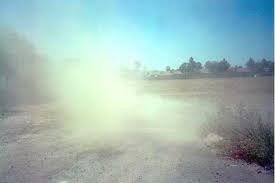Windblown Dust
The Tri-Cities are located in the most arid part of Washington State. In fact, the annual rainfall of 6-8 inches is drier than most parts of Arizona. Because of the combination of climate, soil conditions, and human interaction with the land, dust is often an inevitable result.
Ecology’s Webpage on Outdoor Dust is here. This page includes information on health effects, monitoring and what you can do to protect yourself in the event of dust events.

Windblown dust is common where soil has been disturbed. Weather conditions, the natural environment, and human activities can cause windblown, construction, or fugitive dust which contributes to air pollution. High winds can raise large amounts of dust from areas of dry, loose, or disturbed soil.
Outdoor dust can come from:
- Windblown dust
- Tilled, harvested, and fallow farm fields
- Natural areas during highest winds
-
Construction dust
- While work is underway
- Cleared and vacant land
-
Fugitive dust
- Paved and unpaved roads
- Activities on vacant land or disturbed areas
- Unpaved parking lots and equipment yards
- Military training exercises
There is dust moving off my property, what should I do about it?
The WAC governing fugitive dust is here, paragraphs 3 and 9a.
Throughout Washington State, it is the responsibility of the owner or operator of a source of dust to ensure that dust does not move off property to impact others. WAC 173-400-040 (9)(a) states that:
“The owner of operator of a source of fugitive dust shall take reasonable precautions to prevent fugitive dust from becoming airborne and shall maintain and operate the source to minimize emissions.”
Sources of fugitive dust are required under this regulation to control the movement of dust off their property. The BCAA Urban Fugitive Dust Policy (FDP) is an available resource for providing owners and operators information of methods for controlling fugitive dust. These methods are called “reasonable precautions.” It is in the best interest of the owners and operators to control the fugitive dust on their property by being familiar with the FDP and with the applicable State and local regulations. If there are no precautions taken and dust impacts others, the BCAA can take enforcement actions with penalties up to $10,000 per day.
For those that are being impacted by dust from sources, complaints can be made to the BCAA office. The information needed is the complainant’s name, daytime phone number, the name of the site, owner, or contractor, and any other descriptive information about the situation. This will later help the BCAA to identify and contact the source owner or operator.
If the BCAA has not received any complaints about the source in the past, the Inspector will issue a warning letter outlining the regulations to the owner or operator of the source. If previous complaints have been received the Inspector may issue a Notice of Correction (NOC) or a Notice of Violation (NOV). The NOC outlines a specific list of requirements that the source must take to avoid a penalty. The NOV is essentially a ticket for violating the fugitive dust regulation.
I am being impacted by dust and it is causing property damage or creating a health problem. What can I do about it?
Throughout Washington State, it is the responsibility of the owner or operator of a source of dust to ensure that dust does not move off property to impact others. WAC 173-400-040 (9)(a) states that:
“The owner of operator of a source of fugitive dust shall take reasonable precautions to prevent fugitive dust from becoming airborne and shall maintain and operate the source to minimize emissions.”
In order do begin the enforcement process, it is very important that the BCAA receives a complaint for the person being impacted. This complaint will help the BCAA to identify and contact the source owner or operator. Upon receiving your complaint, one of the BCAA Inspectors will contact the owner or operator of the source of dust. In many cases, contact by the BCAA will encourage the source owner or operator to control the dust. Once the source owner or operator has been informed on the regulations and has chosen not to follow them, the BCAA can increase enforcement efforts. If previous complaints have been received the BCAA may issue a Notice of Correction (NOC) or a Notice of Violation (NOV). The NOC outlines a specific list of requirements that the source must take to avoid a penalty. The NOV is essentially a ticket for violating the fugitive dust regulation. Penalties of up to $10,000 per day can also be assessed.


